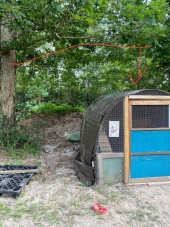
 5
5




 8
8




A piece of land is worth as much as the person farming it.
-Le Livre du Colon, 1902
 5
5




 7
7




Lorinne Anderson: Specializing in sick, injured, orphaned and problem wildlife for over 20 years.
 4
4




 5
5




. . . bathes in wood chips . . .
 4
4




 5
5




Standing on the shoulders of giants. Giants with dirt under their nails
 6
6




 7
7




 4
4




'Theoretically this level of creeping Orwellian dynamics should ramp up our awareness, but what happens instead is that each alert becomes less and less effective because we're incredibly stupid.' - Jerry Holkins
 4
4




AngelinaGianna Maffeo wrote:Possums are the danger at my place. Nothing like opening the door and finding your fave giant cochin hen gutted and beheaded. My rooster had been killed two weeks before. Now I have a pair of geese who patrol the yard. The other night I saw a possum on my security camera coming up the driveway toward the back yard. By the time I got out the door, down the steps and around the house the possum was coming back down the drive. Gandolf and Galadriel were at the back gate, wings open, raising hell. Cleopatra was sitting on the fence watching the whole scene play out. Pretty sure I head her purr.. "Nicely done" to the geese.
 2
2




 3
3




. . . bathes in wood chips . . .
 5
5




Anne Pratt wrote:
Everyone tells us that an electrified perimeter is the way to go, and some barrier from above.
Tj Jefferson wrote: I do think electricity is far far more effective than static fencing.
"Study books and observe nature; if they do not agree, throw away the books." ~ William A. Albrecht
 3
3




James Freyr wrote:Electric fence works great when 1) the energizer is not undersized and has enough oomph to hurt, 2) the energizer has adequate grounding.
... and I lost a hen to what I believe an owl. The entire neck and head were gone, severed cleanly with just 5 or 6 feathers on the ground and the body untouched. Never seen anything like it before.
 4
4




 5
5




 4
4




 .
. Our Destination is Our Legacy
www.peacefulvalleyfold.com
 5
5




 3
3




 6
6




 4
4




Saepe Expertus, Semper Fidelis, Fratres Aeterni
De Opresso Liber
Trim sends
//BT//
 5
5




Anne Pratt wrote:We consider meat birds (not free ranging) but don't want to make them into little targets.
 8
8




Each generation has its own rendezvous with the land... by choice or by default we will carve out a land legacy for our heirs. (Stewart Udall)






 3
3




Read about Permies.com site basics in this thread: https://permies.com/t/43625/Universal
 3
3




$10.00 is a donation. $1,000 is an investment, $1,000,000 is a purchase.
 4
4




Cd Greier wrote:
Anne Pratt wrote:We consider meat birds (not free ranging) but don't want to make them into little targets.
It took a couple of years but hawks learned that there were standard, white chickens (meat birds) at our place and the losses increased every summer thereafter.
We did two things:
- moved the coop and run closer to the house,
- changed to dark-coloured birds.
No losses so far.
$10.00 is a donation. $1,000 is an investment, $1,000,000 is a purchase.

|
Or we might never have existed at all. Freaky. So we should cherish everything. Even this tiny ad:
Learn Permaculture through a little hard work
https://wheaton-labs.com/bootcamp
|


